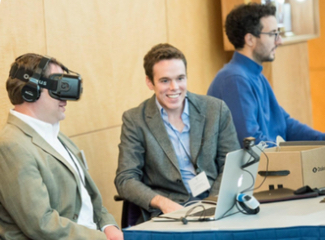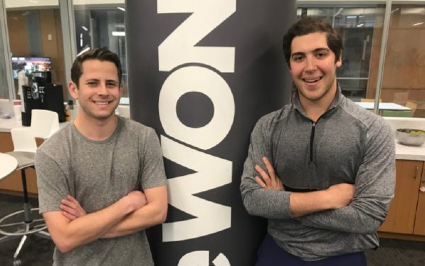By Jenna Somers
Since the inception of the Vanderbilt I-Corps Site Program just three years ago, more than 20 teams of VU innovators have been accepted into the National Science Foundation’s prestigious National I-Corps Program, turning their STEM ideas and research into novel inventions that improve health care, strengthen cybersecurity, produce clean energy, support people battling drug abuse and mental health disorders, and more.
The Wond’ry and the Vanderbilt Institute for Surgery and Engineering, guided by the mission of the Office of the Vice Provost for Research, collaborated with the NSF to create the Vanderbilt I-Corps Site Program in 2017.
Very Real Help and Zeno Power are two of the dynamic startups to emerge from the Wond’ry’s entrepreneurship programs, where the teams received micro-grant funding, and the NSF’s National I-Corps experience, from which they received an additional $50,000. Since completing I-Corps, these companies have continued to grow and reflect the spirit of innovation at Vanderbilt.
Very Real Help

On the last day of his National I-Corps program in 2018, Noah Robinson, a clinical psychology doctoral student, officially created his company, Very Real Help, which uses virtual reality to deliver peer support for substance abuse and mental health disorders. Whether fighting a drug craving, anxiety, depression or other mental health disorders associated with drug abuse, users can put on virtual reality headsets and escape to a world where they can receive support from peers 24 hours a day, seven days a week.
Robinson began testing VR therapy at JourneyPure, a substance abuse center where he completed his clinical training. Patients at JourneyPure walked out of VR sessions reporting that all of their anxiety and cravings were gone. Based on the advice of Robinson’s doctoral adviser, Steve Hollon, Gertrude Conaway Vanderbilt Professor of Psychology, Robinson knew he had uncovered a potentially monumental discovery and that he needed to take as much time as necessary to understand the mechanisms leading to the effect.
Since Robinson completed the National I-Corps program, Very Real Help has raised about $1 million in funding from public and private investors, including through a strategic partnership with JourneyPure, support from a Phase I National Institutes of Health Small Business Technology Transfer award, and from Jumpstart Foundry, a health care accelerator in Nashville. Very Real Help is also applying for a Phase II STTR grant.
The COVID-19 pandemic has accelerated interest in mental health support, making the intervention offered by Very Real Help especially relevant. In September 2020, Robinson gave a talk at a TEDxNashville event where he explained how VR allows participants to attend rather effective peer support sessions from the comfort of their homes, immersing users into carefully controlled therapeutic environments. Since the pandemic began, demand for VR intervention has increased, so Very Real Help has also created a desktop version of the app in which users can log in to a two-dimensional environment. Many users have expressed relief in accessing Help Club in desktop as an alternative to Zoom, since they are allowed more anonymity and an expansive support network through dynamic 3D environments.
As Very Real Help continues to expand, Robinson remains deeply appreciative of his mentor at the Wond’ry, Shawn Glinter.
“I definitely would not be where I am today without Shawn,” Robinson said. “He’s been with me since the moment I had an idea to start a company to where we are now. When you’re coming from academia and don’t know how to run a business, it’s critical to have a Wond’ry mentor like Shawn.”
Zeno Power

From deep sea to deep space, Zeno Power is revolutionizing clean power production through a microwave-sized device that generates electricity for decades without needing maintenance or refueling. Ideal for use in remote, austere settings, the technology works by converting recycled nuclear waste—decaying radioisotopes—into electricity, resulting in clean power applicable in any environment.
Tyler Bernstein, BE’20; Jonathan Segal, BS’19; Jake Matthews, MS’18; and Steven Krahn, professor of the practice of nuclear environmental engineering, can boast of several notable accomplishments since completing the National I-Corps program in 2018 as Vanderbilt’s first-ever undergraduate team. After establishing Zeno Power as a full-fledged company with many interested customers, Bernstein and Segal were named to the 2020 Forbes 30 Under 30, and Zeno Power participated in the Techstars Starburst Space Accelerator, where they met with 120 experts in the space field. From there, they received a government contract and raised seed funding to begin building their technology, and most recently, were funded through a Phase II Small Business Innovation Research award. The NASA Jet Propulsion Laboratory also invited them to a full-day brainstorming session, where they discovered compelling uses of their technology for space missions that are infeasible with current power sources.
“As the chief technology officer, it’s pretty exciting to finally start building this technology we have been designing and thinking about for so long,” Matthews said. “As someone who wanted to be an astronaut after serving five years in the Army, it was especially meaningful to have worked in a Vanderbilt lab on space manufacturing supported by a NASA grant and to now build a power generator that may go to the moon.”
Going into space, however, may be just the tip of the iceberg for Zeno Power. “We strongly believe in nuclear power as part of the portfolio of clean energy sources to achieve carbon neutrality and fight climate change,” said Segal, chief operations officer. “We have the opportunity to make use of nuclear waste material and thus support the development of next-generation reactors that could safely generate clean power for even our largest cities.”
The team at Zeno Power credits their I-Corps experience and the Wond’ry’s critical guidance for launching them through the early stages of their success. “I-Corps really teaches you that unless you’re meeting customers’ needs, it doesn’t matter how neat your technology is,” said Krahn, chief safety adviser. “A focus on customers’ needs will guide your technical innovation and allow you to adapt.”
“The Wond’ry was a fantastic resource and a great home for us as innovators and entrepreneurs,” added Bernstein, chief executive officer. “I often wonder, if we went to Vanderbilt four years prior—before the Wond’ry existed—would we have the motivation and the resources to be where we are today?”